democracynow.org
Stories:
 Native American Activist Winona LaDuke at Standing Rock: It's Time to Move On from Fossil Fuels
Native American Activist Winona LaDuke at Standing Rock: It's Time to Move On from Fossil Fuels
While Democracy Now! was covering the Standing Rock standoff earlier this month, we spoke to Winona LaDuke, longtime Native American activist and executive director of the group Honor the Earth. She lives and works on the White Earth Reservation in northern Minnesota. She spent years successfully fighting the Sandpiper pipeline, a pipeline similar to Dakota Access. We met her right outside the Red Warrior Camp, where she has set up her tipi. Red Warrior is one of the encampments where thousands of Native Americans representing hundreds of tribes from across the U.S. and Canada are currently resisting the pipeline’s construction.
TRANSCRIPT
This is a rush transcript. Copy may not be in its final form.
AMY GOODMAN: This is Democracy Now!, democracynow.org, The War and Peace Report. I’m Amy Goodman. While Democracy Now! was covering the standoff at Standing Rock earlier this month, on Labor Day weekend, we spoke to Winona LaDuke, longtime Native American activist, executive director of the group Honor the Earth. She lives and works on the White Earth Reservation in northern Minnesota. She spent years successfully fighting a pipeline similar to Dakota Access, the Sandpiper pipeline. We met her right outside the Red Warrior Camp, where she has set up her tipi. Red Warrior is one of the encampments where thousands of Native Americans, representing hundreds of tribes from across the U.S. and Canada, are currently resisting the pipeline’s construction. Her tipi is painted with animals that are threatened by climate change. We began by asking Winona LaDuke why communities are now protesting the pipeline.
WINONA LADUKE: It’s time to end the fossil fuel infrastructure. I mean, these people on this reservation, they don’t have adequate infrastructure for their houses. They don’t have adequate energy infrastructure. They don’t have adequate highway infrastructure. And yet they’re looking at a $3.9 billion pipeline that will not help them. It will only help oil companies. And so that’s why we’re here. You know, we’re here to protect this land.
AMY GOODMAN: Explain what happened to the Sandpiper pipeline, the one that you protested, the one that you opposed.
WINONA LADUKE: What we opposed, yeah. So, for four years, the Enbridge company said that they absolutely needed a pipeline that would go from Clearbrook, Minnesota, to Superior, Wisconsin. That was the critical and only possible route. They proposed a brand-new route that would go through the heart of our best wild rice lakes and territory, skirting the reservations, but within our treaty territory. They did not consult with us, and they made some serious errors in their process. They underestimated what was going to happen there.
And so, for four years, we battled them in the Minnesota regulatory process, which is a process which is more advanced and slightly more functional than North Dakota’s regulatory process, which, from what I can see, is largely nonexistent. And in that process, we attended every hearing. We intervened legally. We rode our horses against the current of the oil. We had ceremonies. And they cancelled the pipeline. That’s what they did, after four years’ very, very ardent opposition by Minnesota citizens, tribal governments, tribal people, you know, on that line.
And that pipeline, you know, big problem—we still have six pipelines in northern Minnesota to go to Superior, the furthest-inland port. But their new proposals are not going to happen there. Enbridge has said that they still want to continue with their proposals for line three. The first pipeline they want, they want to abandon. The beginning of a whole new set of problems in North America, the abandoning of 50-year-old pipelines, with no regulatory clarity as to who is responsible. And so we are opposing them on that, that they cannot abandon, and they cannot—they still cannot get a new route.
But when they announced that, you know, in my area, I could have said, "Hey, good luck, y’all. We beat it here. Good luck." You know? But, no, we said we’re going to follow them out here, too, because we believe that—you know, we could spend our lives fighting one pipeline after another after another, but someone needs to challenge the problem and say, "This is not the way to go, America. This is not the way to go for any of us." So, we came out here to support these people.
AMY GOODMAN: So talk about everyone who’s out here.
WINONA LADUKE: There are a lot of people out here, you know? It’s very funny, because I feel like I’ve been like the Standing Rock switchboard, the travel guide, for the past two weeks. You know, everybody hits me up on Facebook, calls me up: "Hey, LaDuke, I want to bring out this. I got some winter coats. You know, what should I do?" I was like, "Oh, my gosh!" You know?
So, a lot of people are coming here, united. You know, so what I know is out here is like—you know, I go walk in here, and I’ve seen people from the—you know, from Wounded Knee in 1973. I’ve seen people I worked with in opposing uranium mining in the Black Hills in the 1970s and '80s, you know, out here. I mean, I've been at this a while. You know, it’s like Old Home Week out here. I’ve seen people from Oklahoma that opposed the Keystone XL pipeline, and Nebraska. And I’ve seen people from, you know, out in our territory that are opposing the pipelines here. The tribal chairman of Fond du Lac is here, and, you know, a whole host of Native and non-Native people. And there are a lot of people that just do not believe that this should happen anymore in this country, that are very willing to put themselves on the line, non-Indian people, you know, as well as tribal members, and they are here. And it is a beautiful place to defend.
AMY GOODMAN: For people who are watching in New York and Louisiana, in California and India, China and South Africa, why does this matter to them?
WINONA LADUKE: This matters because it’s time to move on from fossil fuels. You know, this is the same battle that they have everywhere else. You know, each day or each week, there’s some new leak, there’s some new catastrophe in the fossil fuel industry, as well as the ongoing and growing catastrophe of climate change. The fact that there is no rain in Syria has directly to do with these fossil fuel companies. You know, all of the catastrophes that are happening elsewhere in the world has to do with the fact that North America is retooling its infrastructure and going after the dirtiest oil in the world—the tar sands oil and the oil out of North Dakota, the fracked oil—rather than—you know, they were working with Venezuela’s—it also has to do with crushing Venezuela, because Venezuela has the largest oil reserves in the world. And rather than do business with Venezuela, they were bound and determined to take oil from places that did not want to give it up, and create this filthy infrastructure. So, this carbon—this oil is very heavy in carbon and will add hundreds of millions of tons of CO2 to the environment, if these pipelines are allowed through. So, that is—you know, it affects everybody.
AMY GOODMAN: Now, some tribes are for the pipeline. Can you describe the division?
WINONA LADUKE: You know, I don’t know that I would say some tribes are for it. I would say some interests in Indian country have been for the pipeline. I mean, historically, the Three Affiliated Tribes is an oil-producing tribe, but they came down here to support the opposition to the pipeline. They came down there. Their whole tribal council came down here a couple of days ago. You know, but the fact is, is that, you know, some tribes have been forced into production of fossil fuels. Eighty-five percent of the Navajo economy, for instance, is fossil fuel-based. About the same percentage of the Fort Berthold economy is fossil fuel-based.
So, you know, just to give a little historic picture: You come out here with your smallpox, and you wipe out 95 percent of the people, the Mandan, Hidatsa and Arikara people, in the early 1800s. They live along these villages, you know, just trying to hang in there. Then you come out here, and you flood their lands. And the agricultural crops that they produced are now owned by Monsanto and Syngenta as trademarked varieties that they created. Right? And then you’re out here in North Dakota, and everybody in the country flies over North Dakota and looks down and says, "Well, that’s North Dakota." Nobody comes out here. And so stuff continues out here for a hundred years, where these people are treated like third-class citizens, you know, where they have no running water in their houses, and they have oil companies coming out here. And you have high rates of abuse and violence against women and children, and it accelerates and increases in the oil fields, until you have an epidemic of drugs, which now hits this community. This community doesn’t get any benefit from oil, but the meth and heroin that came out of those fields is here, you know? Because those dealers came up here, and then they saw these Indian people, and they said, "Well, we’ll just go there." And so these reservations are full of it. You know? And then you say, you know, to that tribe up there, the BIA cuts some backyard deals and starts oil extraction. And so, then you—
AMY GOODMAN: The Bureau of Indian Affairs.
WINONA LADUKE: Bureau of Indian Affairs. And then you end up with oil—you end up with haves and have-nots in the oil fields. And you end up with a tribe that now has oil revenues that are coming in. And they look out there, frankly, and they say, "You know? Things haven’t been going too well for us, so we’re going to sign a few more of these leases, because, after all, you know, nothing has ever worked out well for us. And so, we’re going to get a little bit of money." And that’s how you get—you know, you force people into that, with a gun to their head, and then they end up destroying their land, you know, which is what is happening up there on that reservation. And they’ve had huge investigations into corruption at the leadership. But, you know, you force poor people. You force people into that situation, and that’s a perfect storm.
AMY GOODMAN: You’ve talked and written about Native Americans having PTSD, post-traumatic stress syndrome.
WINONA LADUKE: Yeah, we have ongoing; I didn’t finish it, I still have it. You know, you say "Enbridge," and I get this little like quirk, you know, and because the Indian wars are far from over out here. But, you know, what you get is intergenerational trauma, is what it is known as, historic trauma. And other people have it. But you have a genetic memory, and you look out there, and you see—every day you wake up, and you see that your land was flooded. And that big power line that runs through this land, that doesn’t benefit you. You still have to—you know, everything that is out here was done at your expense, but you still have to pay for it. And every day you go out there, and some—you know, you got a roadblock, that the white people put up, coming into your reservation. And every day you go out there, and you look at your houses, and you see that you’ve got crumbling infrastructure, and nobody cares about it. And you’ve got a meth epidemic, and you’ve got the highest suicide rates in the country, but nobody pays attention. You know, and so you just try to survive. That’s what you’re trying to do. Like 90 percent of my community, generally, I would say, is just trying to survive.
You know, I mean, in my community, we have rice. We still have our wild rice. And we can go, and we can harvest wild rice. And we can be Anishinaabe people. You know, we can still live off of our land. You know, these people have a much tougher time living off of their land. The buffalo were wiped out, you know? But this year is their stand. This is their stand. They’ve got a chance to not have one more bad thing happen to them. And from my perspective, my perspective is, is that $3.9 billion pipeline, these guys don’t need a pipeline. What they need is solar. What they need is wind. Look at this wind. You know, what they need—they have like class 7 wind out here. What they need is solar on all their houses, solar thermal. They need housing that works for people. They need energy justice. This is this chance, America, to say, "Look, this community does not need a pipeline. What this community needs is real energy independence." They call this energy independence, you know, shoving a pipeline down people’s throats, so that Canadian oil companies can benefit, and, you know, a bunch of people can—the world can worsen. That is not energy independence. Energy independence is when you have solar. Energy independence is when you have wind. Energy independence is when you have some control over your future. That’s what these people want.
AMY GOODMAN: That was Winona LaDuke, longtime Anishinaabe activist from White Earth Reservation in northern Minnesota.
... Read More →
To discuss Friday’s district court ruling in the Standing Rock Sioux Tribe’s lawsuit against the U.S. government to stop the Dakota Access pipeline, and the White House’s dramatic intervention less than an hour later, we go to Standing Rock to speak with Standing Rock Sioux Chairman Dave Archambault. We are also joined by attorney Jan Hasselman, who brought the tribe’s case to federal court.
TRANSCRIPT
This is a rush transcript. Copy may not be in its final form.
AMY GOODMAN: This is Democracy Now!, democracynow.org, The War and Peace Report. I’m Amy Goodman, as we continue our coverage of the standoff at Standing Rock, where thousands of Native Americans from hundreds of tribes across the United States and Canada are resisting construction of the $3.8 billion Dakota Access pipeline. It’s the largest unification of Native American tribes in decades.
Well, for more on Friday’s district court ruling in D.C. in the Standing Rock Sioux Tribe’s lawsuit against the U.S. government, and the White House’s dramatic intervention less than an hour later, we’re joined now by two guests. Dave Archambault is chair of the Standing Rock Sioux Tribe. He’s joining us via Democracy Now! video stream from North Dakota. And in Seattle, Washington, we’re joined by Jan Hasselman, staff attorney with Earthjustice, representing the Standing Rock Sioux Tribe in its lawsuit against the Army Corps of Engineers over the Dakota Access pipeline.
Let’s go first to Standing Rock. Chairman Dave Archambault, your response to what happened on Friday?
DAVE ARCHAMBAULT II: First, we were disappointed by the judge’s decision. But then, a few minutes later, we were elated. It was something that was encouraging, because we knew that we were standing for something that was not right. And there were a lot of prayers, and I think those prayers were answered. And so it was a good feeling. And it still is a good feeling knowing that there’s the opportunity for us to look at public policy and reform, so that our indigenous lands and our indigenous rights are not infringed on.
And with the ruling, I know that it was something that we had to do. I felt that, all along, the deck was stacked against us. But we had to do it to start building awareness, and we had to look at whatever laws we could to get the issue to the forefront. And it’s just an ongoing battle. We’ll appeal. We are appealing. And we’re going to be asking for a full EIS, environment impact study, for the project. And the work isn’t done. We have a long ways to go, and we’re going to be doing whatever we can.
AMY GOODMAN: I want to go back to the joint statement released Friday, just 15 minutes after the Standing Rock Sioux Tribe was defeated in federal court, the statement released Friday by the Obama administration, by the Departments of Interior, Justice and the Army Corps of Engineers. It reads, quote, "[T]his case has highlighted the need for a serious discussion on whether there should be nationwide reform with respect to considering tribes’ views on these types of infrastructure projects. Therefore, this fall, we will invite tribes to formal, government-to-government consultations on two questions: (1) within the existing statutory framework, what should the federal government do to better ensure meaningful tribal input into infrastructure-related reviews and decisions and the protection of tribal lands, resources, and treaty rights; and (2) should new legislation be proposed to Congress to alter that statutory framework and promote those goals." Chairman Dave Archambault, what does that mean to you?
DAVE ARCHAMBAULT II: It means there’s a crack in the door. And we’re going to start nudging, and we’re going to see what we can do to open it as wide as we can so that our indigenous rights and our indigenous lands are no longer infringed on.
AMY GOODMAN: I want to go to Jan Hasselman for a moment. You’re the lawyer who brought the case of the Standing Rock Sioux Tribe to federal court. Can you just describe for us this dramatic series of events that took place on Friday?
JAN HASSELMAN: Yeah. Well, good morning, Amy. Thanks for having me back. Everybody knew that the court case was an uphill struggle. And we took our best shot. But we were reading this opinion that denied the relief we were asking for, and it was crushing, because everyone had put a lot of effort into that. And then, 15, 20 minutes later, the world turned upside down with this announcement from the administration, which is really what the tribe has been asking for all along. This is a situation that calls out for intervention and leadership at the highest levels to de-escalate the tensions out there, to address the really fundamental unfairness of the process. And so, we were very heartened that the Obama administration stepped in and took that leadership role, so there’s going to be a timeout on additional permitting, and we’re going to have the kind of conversation that the tribe has been asking for from the very beginning.
AMY GOODMAN: Now, just to understand this—I don’t know if this is unprecedented. You had—the Standing Rock Sioux Tribe was fighting the Justice Department in federal court. So, it was the Justice Department lawyers who experienced this victory, for them, when the federal court ruled against the tribe. Was it, what, 15 minutes later that their own department, the Justice Department, together with the Army Corps of Engineers and the Department of the Interior, made this announcement?
JAN HASSELMAN: Yeah, that’s right. This is pretty stunning, a pretty stunning move, that changes the equation of where are we going from here. We’re going to take them at their word that this is going to be a serious top-to-bottom review of the permitting. And what that means, under the law, is that they’re going to have to consider all of the options that are on the table. And one of those options is not building a pipeline. Another option is put it back in its original route, north Bismarck, and let’s see how much the politicians in Bismarck are excited about crude oil pipelines when it’s their water supply that’s at risk instead of the tribe’s. So, all of that is going to take a little bit of time, and the tribe is ready to begin engaging in that process and begin having that conversation.
AMY GOODMAN: But just to be clear, when it comes to the Dakota Access pipeline, the statement, the triple statement from Army, Justice and Interior—so, clearly, from the White House, from on high—is asking the pipeline to voluntarily not build on the places, for example, that we recorded that standoff at—on September 3rd, on Labor Day weekend, where the pipeline security unleashed dogs and pepper spray on the Native Americans who were there. They’re asking them to voluntarily not build? They can build?
JAN HASSELMAN: Well, let’s be clear about exactly what the statement was. So, the area where the federal government has the clearest permitting authority is the tunnel underneath Lake Oahe, and they’ve said they’re not going to issue that without a permit. So they can’t do that work. They’ve asked the company to stand down on construction on 20 miles on either side. This will be a test of the company’s good faith in the process, if they heed that. Now, we are going to be asking the federal appeals court to enforce that 20-mile no-build zone through court order. We’ll be filing that today. And we’ll see where that happens. But to the extent that the company needs additional permits from the Army Corps, it would seem to me that thumbing their nose at them and ignoring this request would be a very bad strategy.
AMY GOODMAN: Dave Archambault, can you describe what happened on Thursday? In preparation, the governor of North Dakota called out the National Guard. And then, describe the scene—in preparation for the court ruling decision. Could you then describe the scene—increase in road checkpoints, which you’ve had for a long time now? Describe that scene for us and what happens to people as they drive.
DAVE ARCHAMBAULT II: OK, Amy. When the governor first set up the blockade and started rerouting our members, I immediately called him, and I asked him to take the blockade down. And I had multiple calls with him, and my requests were the same every time. In our discussions, I had let him know that—let him know that you can—if your concern is safety—and that’s what he said, his concern is safety with pedestrians on Highway 1806—I said we could add additional signs, and you could—you can allow people to go through, but just have them be aware. Give them notice that there may be some people on the roads, and we could have multiple signs to slow the traffic.
Now, before this, Amy, about a—when everything first started on Standing Rock, I have about eight officers total for my reservation. And there’s 2.3 million acres, 12 communities, eight officers, maybe two or three at a time working five days a week, 12-hour shifts. And as the camp began to grow, attention with the officers began to circle around the community of Cannon Ball, where—close to camp. So I made a request for additional BIA law enforcement, not to patrol or to observe or to monitor the camp, but to assure that safety is throughout Standing Rock. So I was able to get 31 additional BIAofficers. And it helped, because now there’s a—
AMY GOODMAN: Bureau of Indian Affairs.
DAVE ARCHAMBAULT II: Yeah, Bureau of Indian Affairs law enforcement. And it helped, because there’s safety in the communities. And that was my concern for my nation, was to make sure that safety is a priority now.
When the governor made the announcement, I called him immediately, and I asked what this was about. And the resources that the governor has within the state, with Highway Patrol and within the counties, Burleigh County and Morton County, were all focused on the blockade. And so, what his—he had said was that it’s not a full-blown National Guard deployment. It’s minimal. And what it is going to be used for is to inform traffic. We’re going to open up the blockade, so they can go through, but just inform them—this was the ask that I had—to allow people to come through 1806 rather than rerouting them. And the Highway Patrol, the Burleigh—the law enforcement in Burleigh County and Morton County can then be used throughout the state, throughout other parts of the state.
So, I understand where the governor was coming from. And there’s a lot of emphasis that "The National Guard is deployed, and we’re going to—we’re going to shut this camp down." And that wasn’t the case. The National Guard that’s manning the blockade and allowing people to go through 1806, they’re really friendly guys. And they’re informing people that there may be pedestrians on the road, just be cautious. It’s 25, 30 miles down the road. There’s an encampment there. And everybody knows what’s going on, so—
AMY GOODMAN: Is facial recognition technology being used?
DAVE ARCHAMBAULT II: That’s a crazy question, Amy, and I’m glad you ask it, because when you have a lot of people in an area, there’s all this paranoia that is present. And we don’t have to be paranoid anymore. We need to be proud of who we are. This is a big time in history. We need to hold our chins high and show our faces. We’re not doing anything wrong. And if facial recognition technology is out there, I would doubt that it’s here. All authorities have to do is go on Facebook, go on the Democracy Now! videos, and they’ll see people’s faces there. And that’s where authorities are getting information. The people who are videoing incidents determine—we create the evidence on ourselves with these—with our iPhones and social media. I would highly doubt that facial recognition is something—we have our own websites, we have our own Facebook pages. We give all the information that is out there to the authorities through social media.
AMY GOODMAN: But, for example, if someone has a warrant out for their arrest, that’s the place where they will be picked up. If they’re just driving, they won’t be. But if there is a roadblock, for—a checkpoint, that’s where they get picked up.
DAVE ARCHAMBAULT II: Well, if they have something that they’ve done wrong, you should own up to your—you should be accountable for yourself. And if there’s a warrant for your arrest, why are you out? Why aren’t you going to authorities and getting it taken care of?
AMY GOODMAN: Well, I want to read a joint statement released Friday by the Obama administration, which notes that, quote, "[W]e fully support the rights of all Americans to assemble and speak freely. We urge everyone involved in protest or pipeline activities to adhere to the principles of nonviolence. Of course, anyone who commits violent or destructive acts may face criminal sanctions from federal, tribal, state, or local authorities. The Departments of Justice and the Interior will continue to deploy resources to North Dakota to help state, local, and tribal authorities, and the communities they serve, better communicate, defuse tensions, support peaceful protest, and maintain public safety." You know, in the case, for example, in my own case, Chairman Archambault, where the state of North Dakota has issued a warrant for my arrest, it’s for covering the protest on September 3rd. And as I understand it, others who are wanted for—who are wanted, that is where the point of contact is, where you won’t be picked up on the road, in general, but if there is a checkpoint, in that interaction, that’s what happens.
DAVE ARCHAMBAULT II: Well, again, you know, I think that there are things that are legal and are completely wrong, and it’s OK to stand up for them. There are things that are illegal but are completely right, and it’s OK to stand up for them. And so, if you do something in that way, like you did, Amy, it’s OK, it’s good, because the coverage that you did is valuable to the cause. And so, when you do something, when you commit an act, and it’s viewed as illegal, but everybody knows there’s a natural law that it’s right, then it’s OK to own up to what you have done.
AMY GOODMAN: Chairman Archambault, you yourself were arrested, is that right, at one of the protests?
DAVE ARCHAMBAULT II: Yes, I was.
AMY GOODMAN: So, what are your plans now? The decision came down against the tribe, but then the Obama administration released this joint statement of Army, Interior and Justice. Are the camps going to continue? You’ve got thousands of people now at the camps, and more and more joining every day.
DAVE ARCHAMBAULT II: Yeah, like I said, the door is cracked open. And so, what I feel is, until it’s blown wide open and this pipeline does no longer—no longer infringes on our lands and on our rights, I can’t tell you an end date. But I know that there are more tribes, there are more organizations. It’s worldwide now, people coming from all over. We just had tribes from Ecuador and the chief from Ecuador come in, and the same concerns. You know, there’s this building awareness on indigenous people and the lands that they have and the protection that they want to offer. This awareness is coming around. We have people from Hawaii trying to protect their mountain, their sacred mountains, from development, from corporations or their government. So, it’s a shared concern. And it’s—what I like to call is it’s a spirit awakening. And so, to try to say there’s going to be—
AMY GOODMAN: Has the Dakota Access pipeline folks told you they are going to voluntarily stop the construction and the bulldozing?
DAVE ARCHAMBAULT II: I haven’t spoke to Dakota Access pipeline folks. And that’s a good question for them.
AMY GOODMAN: And, Jan Hasselman, as the lawyer who has been fighting the pipeline, have you gotten any word?
JAN HASSELMAN: We don’t know. I think they were probably as surprised as we were with the announcement on Friday. Like I said, we’ll be going back to the court and having that conversation. So I think, the week ahead, we’ll know a lot more about where things are going.
AMY GOODMAN: I want to thank you both for being with us, Dave Archambault, chair of the Standing Rock Sioux Tribe, speaking to us from Bismarck, North Dakota, and Jan Hasselman, attorney with Earthjustice, speaking to us from Seattle, Washington. When we come back, we’ll hear voices of that largest gathering that we’ve seen of Native tribes in decades. We’ll hear, among others, from indigenous leader Winona LaDuke. Stay with us.
[break]
AMY GOODMAN: "We are a Nation of Animal Lovers" by Ewan MacColl. Happy birthday to producer Sam Alcoff’s father, Larry Alcoff. ... Read More →
 Water Protectors at Standing Rock React to Obama's Intervention in Dakota Access Pipeline Battle
Water Protectors at Standing Rock React to Obama's Intervention in Dakota Access Pipeline Battle
In a dramatic series of moves on Friday, the White House intervened in the ongoing fight against the Dakota Access pipeline, less than an hour after a federal judge rejected the Standing Rock Sioux Tribe’s request for an injunction against the U.S. government over the pipeline. "It’s not a solid victory now but just the weight, feeling that weight that I’ve been carrying for the last couple months is lifting. I feel like I could breathe right now," says Floris White Bull. We feature the reactions to government’s intervention from some of the thousands of Native Americans who have gathered along the Cannonball River by the Standing Rock Sioux Reservation to resist the pipeline’s construction.
TRANSCRIPT
This is a rush transcript. Copy may not be in its final form.
AMY GOODMAN: We begin today’s show with major updates in the fight by Native Americans to stop the proposed $3.8 billion Dakota Access pipeline, which would carry about 500,000 barrels of crude oil a day from the Bakken oil fields of North Dakota through South Dakota, Iowa and into Illinois. The project has faced months of resistance from the Standing Rock Sioux Tribe and members of hundreds of other tribes from across the United States and Canada who flocked to North Dakota in what’s being described as the largest unification of Native American tribes in decades.
In a dramatic series of moves late Friday afternoon, a federal judge rejected the Standing Rock Sioux Tribe’s request for an injunction against the U.S. government over the Dakota Access pipeline. Then, the Army, the Department of Justice and the Department of the Interior responded with a joint announcement that the Army Corps will not issue permits for Dakota Access to drill under the Missouri River until the Army Corps reconsiders its previously issued permits. In a statement, the Department of Justice said, quote, "(c)onstruction of the pipeline on Army Corps land bordering or under Lake Oahe will not go forward at this time," unquote. The federal agencies also asked the Dakota Access pipeline company to voluntarily cease construction 20 miles east and west of Lake Oahe.
The government’s intervention was welcomed by thousands of Native Americans who have gathered along the Cannonball River by the Standing Rock Sioux Reservation to resist the pipeline’s construction. Here are some of their reactions.
FRANCINE GARREAU HALL: Francine Garreau Hall. I’m with the Cheyenne River Sioux Tribe. I’m Miniconjou, Itazipcho and Hunkpapa bands of the Teton Lakota. I am very grateful, because in our government-to-government relationship, the federal government is bound by treaty law to protect our interests. And I’m glad that they stepped up to the plate today and did that.
I think all the American people need to recognize and they need to realize that this isn’t a racial deal. This is something that impacts all of us. We all, as children of God, have a right to clean water. And that’s what this fight is about. It’s about recognizing that mni wiconi, water is life. And without it, we all die. And so, we are protecting water for the future generations. I had to be here, because I wanted—it was my time to be accountable. Seven generations from now, I want my grandkids and their children to say, "She stood, so that we could have clean water."
BILL PICOTTE: My name is Bill Picotte. I’m a member of the Cheyenne River Sioux Tribe. Like everybody else, I think I’m pretty happy with the decision for them to step in. I know that maybe it’s not the end of the battle, but at least today, you know, we celebrate a small victory. You know, there are still things to be considered. And I think, at least for me, it appears that they want to do things fairly.
Hopefully, there will be more tribal consultation, and not just with Standing Rock, but with all tribal nations, in the future. Maybe this will show the United States and the world that, I think, Native American people are tired of being walked on, tired of being taken for granted, tired of being invisible, and that we’re going to stand up for ourselves. And I’ve seen some atrocious things, to me, you know? The girl that was bit in the chest was my cousin, you know? And there were pictures on Facebook of that, and I was heartbroken for her, you know? I think I can say that I’m proud of the way we’ve behaved and we’ve acted throughout this.
FLORIS WHITE BULL: Floris White Bull from Standing Rock. My father is from here, Standing Rock. I’m a student as Sitting Bull College. It’s not a solid victory right now, but it’s just the weight, feeling that that weight that I’ve been carrying for the past couple months now, it’s lifting. And I feel like I could breathe right now.
AMY GOODMAN: The Native Americans, who call themselves "protectors," not "protesters," have repeatedly forced the Dakota Access pipeline company to stop construction by locking themselves to machinery. On Saturday, September 3rd, over Labor Day weekend, Dakota Access pipeline company unleashed dogs and pepper spray on Native Americans as they attempted to stop the company from destroying a sacred tribal burial site.
PROTESTER: These people are just threatening all of us with these dogs. And she, that woman over there, she was charging, and it bit somebody right in the face.
AMY GOODMAN: The dog has blood in its nose and its mouth.
PROTESTER: And she’s still standing here threatening us.
AMY GOODMAN: Why are you letting their—her dog go after the protesters? It’s covered in blood!
AMY GOODMAN: That was September 3rd. To see our full report, go to democracynow.org. The bulldozers and company security guards were ultimately forced to retreat. We’re going to break. When we come back, we’ll go to North Dakota to speak with Dave Archambault, the chair of the Standing Rock Sioux Tribe, and Jan Hasselman in Seattle, Washington, staff attorney with Earthjustice who brought the tribe’s lawsuit to federal court. Stay with us.
[break]
AMY GOODMAN: Ana Tijoux singing a cover of Víctor Jara’s "Luchín." It was released on Sunday, on 9/11. 9/11/1973, Salvador Allende, the democratically elected leader of Chile, died in the palace as the Augusto Pinochet forces came to power. ... Read More → Lakota Activist Debra White Plume from Pine Ridge: Why I am a Water Protector at Standing Rock
Lakota Activist Debra White Plume from Pine Ridge: Why I am a Water Protector at Standing Rock
While Democracy Now! was covering the standoff at Standing Rock earlier this month, we spoke to longtime Lakota water and land rights activist Debra White Plume, who was born and raised on the Pine Ridge Indian Reservation in South Dakota and lives along the banks of Wounded Knee Creek. She described what the Dakota Access pipeline means to her.
TRANSCRIPT
This is a rush transcript. Copy may not be in its final form.
AMY GOODMAN: That same day, though, right next to the Red Warrior Camp protesting the pipeline, we spoke to longtime Lakota water and land rights activist Debra White Plume, born and raised on the Pine Ridge Reservation in South Dakota, living along the banks of Wounded Knee Creek. I asked her to talk about what the Dakota Access pipeline means to her.
DEBRA WHITE PLUME: What it means to me is that it pushes us further over the tipping point of not only fossil fuel extraction, but the desecration of Mother Earth and the exploitation of Native peoples in the area, as well as the threat to drinking water. Where I live, six hours from here, when I turn on my tap, the water that comes out is from the Missouri River. It’s a 50-50 mix with the Ogallala Aquifer and the Missouri River, because at home our aquifer is badly contaminated by decades of uranium mining. So, there’s only portions of the aquifer on the Pine Ridge Reservation that pass the Environmental Protection Agency’s maximum contaminant level for alpha emitters. So we have to mix half and half with the Missouri River water.
AMY GOODMAN: And what would happen to the Missouri River water?
DEBRA WHITE PLUME: Well, if the pipeline is put in, it’s going to leak or spill or burst or explode, and that oil is going to get into the water. And Dakota Access pipeline says they’re going to bury it 30 feet under, and they’re assuring everybody that it’s going to be safe. But I think Western science doesn’t really know everything it thinks it knows. And we need to make our decisions based on what’s best for Mother Earth and our coming generations. And that includes protecting our water. Water is under threat all over the world. Right now, there are people who have no access to clean drinking water.
AMY GOODMAN: Do you call yourself a protester?
DEBRA WHITE PLUME: No, I call myself—first and foremost, I’m just a regular human being. I’m a mother and a grandmother, a great-grandmother. I’m Lakota. I’m a woman. And it’s—water is the domain of the women in our nation. And so, it’s our privilege and our obligation to protect water. So, you know, if somebody wants to label me, I guess it would be water protector.
AMY GOODMAN: You go way back to the Pine Ridge Reservation, where you live today, 1973. Could you describe what happened then?
DEBRA WHITE PLUME: Sure. What happened then was the Indian Reorganization Act government, which is an act of Congress, in place in 1934, governs most Native nations in the United States. Well, our IRAgovernment at that time was very oppressive to Lakota people. They were keeping us from having jobs or homes or whatever few services the federal government provided, because we held onto the Lakota way of life, and we also wanted to reclaim not only our identity, but our lands and the care of our land and the responsibility of caring for our land.
And at that time, the tribal president was Dick Wilson, and he had been working with the federal government to sign away one-eighth of our homeland to the federal government. And it just happened to be where there was a lot of what the fat taker calls resources, and they want to mine it—you know, coal, gas, oil, uranium, whatever it may be, water. And so, we put up a ruckus, and we said, "No, you’re not going to do that, because our coming generations need that."
And so, there were a lot of shootouts and armed struggle going on in those days. And in the so-called border towns around us, which we call occupied territory, Indians were getting killed, and their murderers were not being held for justice. They were like charged with the lowest felony there could be, doing two years of probation. And it was just enough was enough. You know, it was a moment in time there was the women’s movement, there was the civil rights movement, there was the Vietnam War stuff going on. And we just said, "That’s enough for us, too. We’re not going to take this anymore." And we stood up, and we fought. You know, we had to fight our own government, and they called in the FBIand the Marshals and the Army. Basically, it was a military occupation of our homeland.
AMY GOODMAN: And what happened then?
DEBRA WHITE PLUME: Well, Wounded Knee was liberated by relatives from the Four Directions. And the military came in and surrounded the little tiny village of Wounded Knee. And the rest is history. But we were able to get our spiritual way of life removed as a criminal act in American law. Prior to that, it had been a crime to practice our way of life. We have many people that went to prison in those days or were committed to, held in and died at state mental institutions for having a sacred pipe or conducting any of our ceremonies.AMY GOODMAN: Lakota leader Debra White Plume of the Pine Ridge Reservation, speaking from Red Warrior. Special thanks to Laura Gottesdiener, John Hamilton, Denis Moynihan. ... Read More → Federal Government Partially Halts Construction of Dakota Access Pipeline
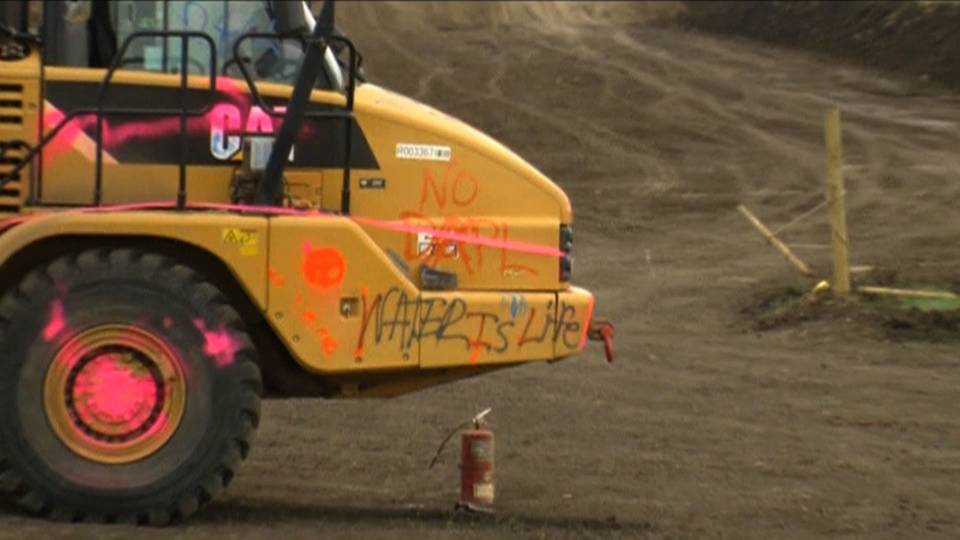 The Obama administration has ordered a halt to construction of part of the $3.8 billion Dakota Access pipeline, which has faced months of resistance from the Standing Rock Sioux Tribe and hundreds of other tribes from across the U.S. and Canada in what’s being described as the largest unification of Native American tribes in decades. In a dramatic series of moves late Friday afternoon, a federal judge rejected the Standing Rock Sioux Tribe’s request for an injunction against the U.S. government over the pipeline. Then the Army, Department of Justice and Department of the Interior responded with an announcement that the Army Corps will not issue permits for Dakota Access to drill under the Missouri River until the Army Corps reconsiders its previously issued permits. The news was welcomed by the protesters who have gathered along the Cannonball River by the Standing Rock Sioux Reservation to resist the pipeline’s construction. This is Francine Garreau Hall of the Cheyenne River Sioux Tribe.
The Obama administration has ordered a halt to construction of part of the $3.8 billion Dakota Access pipeline, which has faced months of resistance from the Standing Rock Sioux Tribe and hundreds of other tribes from across the U.S. and Canada in what’s being described as the largest unification of Native American tribes in decades. In a dramatic series of moves late Friday afternoon, a federal judge rejected the Standing Rock Sioux Tribe’s request for an injunction against the U.S. government over the pipeline. Then the Army, Department of Justice and Department of the Interior responded with an announcement that the Army Corps will not issue permits for Dakota Access to drill under the Missouri River until the Army Corps reconsiders its previously issued permits. The news was welcomed by the protesters who have gathered along the Cannonball River by the Standing Rock Sioux Reservation to resist the pipeline’s construction. This is Francine Garreau Hall of the Cheyenne River Sioux Tribe.Francine Garreau Hall: "I am very grateful, because in our government-to-government relationship, the federal government is bound by treaty law to protect our interests. And I’m glad that they stepped up to the plate today and did that."
The agencies also asked Dakota Access to voluntarily cease construction 20 miles east and west of the Oahe Dam.
TOPICS:
Dakota Access Pipeline
North Dakota v. Amy Goodman: Arrest Warrant Issued After Pipeline Coverage
 In other Dakota Access pipeline news, last Thursday, Morton County, North Dakota, issued an arrest warrant for Amy Goodman. The charge: criminal trespass, a misdemeanor offense. The case, State of North Dakota v. Amy Goodman, stems from Democracy Now!’s coverage in North Dakota over the Labor Day weekend of the Native American-led protests against the Dakota Access pipeline. On Saturday, September 3, Democracy Now! filmed security guards working for the Dakota Access pipeline company using dogs and pepper spray to attack protesters.
In other Dakota Access pipeline news, last Thursday, Morton County, North Dakota, issued an arrest warrant for Amy Goodman. The charge: criminal trespass, a misdemeanor offense. The case, State of North Dakota v. Amy Goodman, stems from Democracy Now!’s coverage in North Dakota over the Labor Day weekend of the Native American-led protests against the Dakota Access pipeline. On Saturday, September 3, Democracy Now! filmed security guards working for the Dakota Access pipeline company using dogs and pepper spray to attack protesters.Protester: "These people are just threatening all of us with these dogs. And she, that woman over there, she was charging, and it bit somebody right in the face."
Amy Goodman: "The dog has blood in its nose and its mouth."
Protester: "And she’s still standing here threatening us."
Amy Goodman: "Why are you letting their—her dog go after the protesters? It’s covered in blood!"
Democracy Now!'s report went viral online and was viewed more than 13 million times on Facebook alone, and our footage was rebroadcast on many outlets, including CBS, NBC,NPR.org, CNN, MSNBC and Huffington Post. Also charged was Cody Hall for his alleged presence at the September 3 land defense action and for a subsequent protest on September 6. Hall is considered a lead organizer in the movement against the Dakota Access pipeline and was arrested at one of the checkpoints that have been erected by North Dakota authorities to restrict access to the Standing Rock Sioux Reservation and the growing pipeline opposition camps. Hall was denied bail and remained in jail throughout the weekend. Hall's attorneys and several others we spoke to confirmed that it is highly unusual for a defendant charged with misdemeanor trespass to be jailed and denied bail.
According to the criminal complaint against Goodman, the charges are based on a viewing of Democracy Now!'s video report of the incident, conducted by the North Dakota Bureau of Criminal Investigation. Special Agent Lindsey Wohl's sworn affidavit states that I was there as a journalist. Wohl wrote, "Amy Goodman can be seen on the video identifying herself and interviewing protestors [sic] about their involvement in the protest." The criminal complaint was approved by Assistant State’s Attorney for Morton County Gabrielle J. Goter. To date, none of the private security personnel shown in the video both assaulting protesters and commanding their dogs to attack them have been charged or arrested. Democracy Now! is consulting with attorneys in North Dakota as well as at the Center for Constitutional Rights.CCR Legal Director Baher Azmy said, "This is clearly a violation of the First Amendment … an attempt to repress this important political movement by silencing media coverage."
TOPICS:
Dakota Access Pipeline
Doctor: Hillary Clinton Falls Ill with Pneumonia and Dehydration
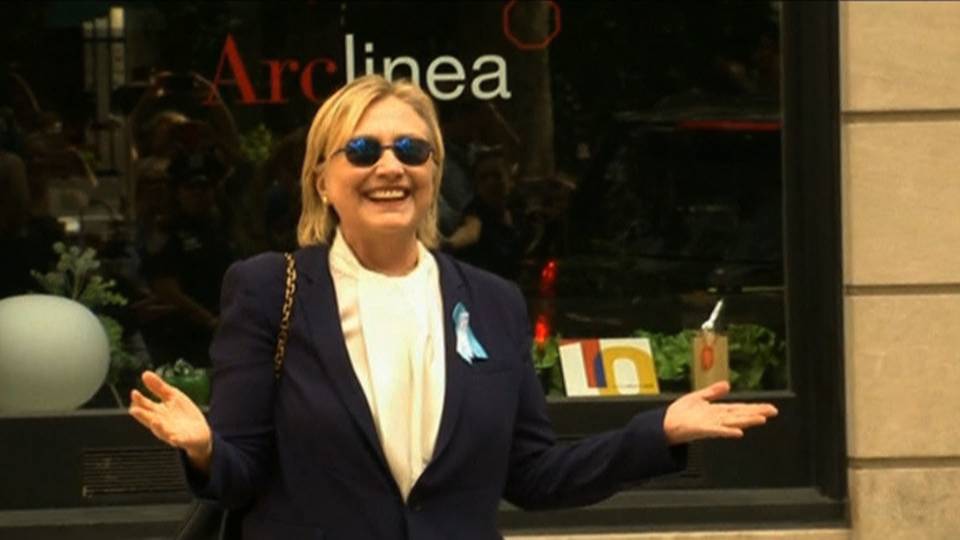 In news from the campaign trail, Hillary Clinton canceled plans to visit California today, after falling ill with what her doctor described as pneumonia and dehydration. On Sunday, Clinton was seen abruptly leaving a ceremony in Lower Manhattan commemorating the 9/11 attacks. Video showed her stumbling as Secret Service agents helped her into a van. Clinton was taken to the Manhattan apartment of her daughter, Chelsea, and emerged about 90 minutes later, waving to reporters.
In news from the campaign trail, Hillary Clinton canceled plans to visit California today, after falling ill with what her doctor described as pneumonia and dehydration. On Sunday, Clinton was seen abruptly leaving a ceremony in Lower Manhattan commemorating the 9/11 attacks. Video showed her stumbling as Secret Service agents helped her into a van. Clinton was taken to the Manhattan apartment of her daughter, Chelsea, and emerged about 90 minutes later, waving to reporters.Reporter: "How are you feeling, Secretary Clinton?"
Hillary Clinton: "Great! I’m feeling great!"
Reporters: "What happened? Give us a little statement."
Hillary Clinton: "It’s a beautiful day in New York."
Hillary Clinton’s doctor later said in a statement the candidate was being treated with antibiotics and was "rehydrated and recovering nicely." Clinton’s campaign says she will rest at her home in Chappaqua, New York. Clinton canceled fundraising events planned for Los Angeles and San Francisco, as well as a scheduled appearance on "The Ellen DeGeneres Show." The illness follows weeks of speculation and conspiracy theories about Clinton’s health put forward by Donald Trump and other Clinton opponents. In August, Trump national spokeswoman Katrina Pierson claimed, without evidence, that Clinton was suffering from "dysphasia," a form of brain injury.
TOPICS:
2016 Election
Hillary Clinton: Half of Trump Supporters a "Basket of Deplorables"
 Clinton’s illness came less than two days after she suggested half of Donald Trump’s supporters are bigoted. Clinton made the comments Friday during a fundraiser at an LGBTQ event in New York.
Clinton’s illness came less than two days after she suggested half of Donald Trump’s supporters are bigoted. Clinton made the comments Friday during a fundraiser at an LGBTQ event in New York.Hillary Clinton: "We are living in a volatile political environment. You know, to just be grossly generalistic, you could put half of Trump supporters into what I call the basket of deplorables. Right? The racist, sexist, homophobic, xenophobic, Islamophobic—you name it."
Donald Trump’s campaign seized on Clinton’s comment. This is Trump’s running mate, Governor Mike Pence.
Gov. Mike Pence: "I campaign on a regular basis with Donald Trump. I campaign all across this country for Donald Trump. Hillary Clinton’s low opinion of the people that support this campaign should be denounced in the strongest possible terms."
Clinton said in a statement on Saturday she regretted calling "half" of Trump supporters bigots, but added, "What’s really 'deplorable' is that Donald Trump hired a major advocate for the so-called 'alt-right' movement to run his campaign and that David Duke and other white supremacists see him as a champion of their values."
TOPICS:
Donald Trump
2016 Election
Rudolph Giuliani: "Of Course It's Legal" to Take Iraq's Oil
 Rudolph Giuliani is defending Donald Trump’s statement last week that the U.S. should have taken Iraq’s oil as part of the "spoils of war." The former New York City mayor, who is a top adviser to Trump, made the remarks Sunday on ABC’s "This Week."
Rudolph Giuliani is defending Donald Trump’s statement last week that the U.S. should have taken Iraq’s oil as part of the "spoils of war." The former New York City mayor, who is a top adviser to Trump, made the remarks Sunday on ABC’s "This Week."George Stephanopoulos: "But he said leave a force back there and take it."
Rudolph Giuliani: "Leave a force back there and take it, and make sure it’s distributed in a proper way. And basically—"
George Stephanopoulos: "That’s not legal, is it?"
Rudolph Giuliani: "Of course it’s legal. It’s a war."
TOPICS:
2016 Election
Donald Trump
Mike Pence Releases Tax Returns, Unlike Donald Trump
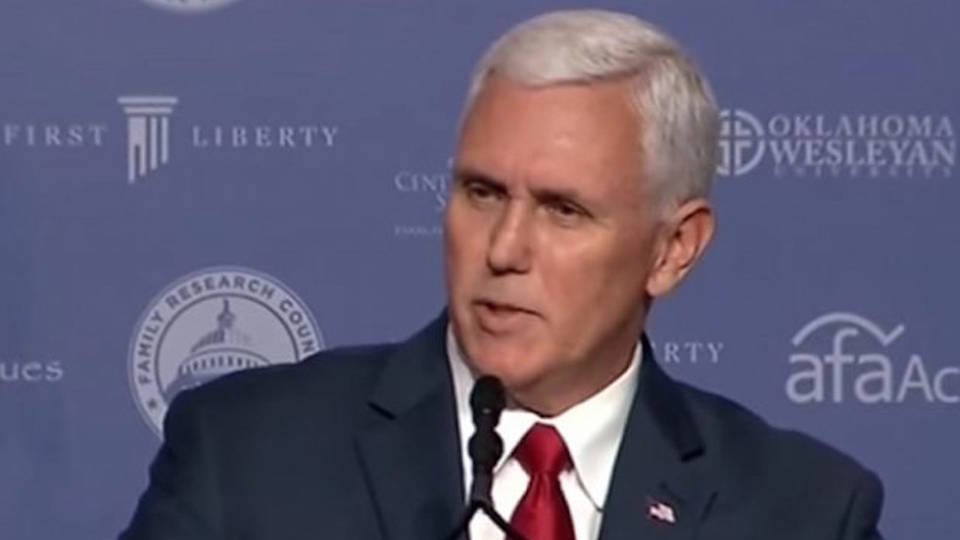 Governor Mike Pence released his 2015 tax returns on Friday, showing the vice-presidential candidate and his wife took in $113,000 last year. Hillary Clinton’s 2015 tax returns show she and Bill Clinton earned $10.6 million in 2015, down from nearly $28 million the year before. Donald Trump has refused to make his tax returns public.
Governor Mike Pence released his 2015 tax returns on Friday, showing the vice-presidential candidate and his wife took in $113,000 last year. Hillary Clinton’s 2015 tax returns show she and Bill Clinton earned $10.6 million in 2015, down from nearly $28 million the year before. Donald Trump has refused to make his tax returns public.TOPICS:
Donald Trump
Syria: U.S. and Russia Agree to Ceasefire Deal
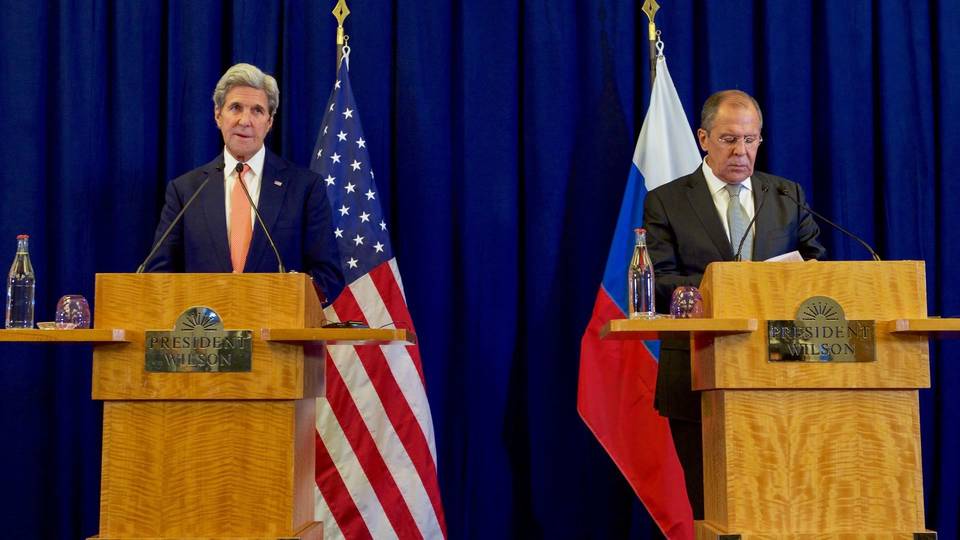 In international news, the U.S. and Russia say warring factions in Syria are set to begin a 10-day ceasefire at sundown tonight. Secretary of State John Kerry said he reached the deal during talks in Geneva with his Russian counterpart, Sergey Lavrov.
In international news, the U.S. and Russia say warring factions in Syria are set to begin a 10-day ceasefire at sundown tonight. Secretary of State John Kerry said he reached the deal during talks in Geneva with his Russian counterpart, Sergey Lavrov.
Secretary of State John Kerry: "Today the United States and Russia are announcing a plan which we hope will reduce violence, ease suffering and resume movement towards a negotiated peace and a political transition in Syria. And we believe that the plan, as it is set forth, if implemented, if followed, has the ability to provide a turning point, a moment of change."
Scores were killed in heavy fighting after news of the ceasefire broke. Witnesses said at least 61 died and over 100 were wounded after a warplane bombed a market in Idlib. The Syrian Observatory for Human Rights said another 30 people were killed in Aleppo province. The ceasefire calls for Syria’s government to stop bombing cities and allow humanitarian aid corridors. Russia will cease bombing all targets except for ISIS, and the U.S. will force the rebel groups it arms to break allegiance with a group that has pledged support for al-Qaeda. The U.S. and Russia may also begin joint bombing campaigns. Several previous ceasefires in Syria have collapsed.
TOPICS:
Syria
Russia
9/11 Memorials Mark 15th Anniversary of Attacks
Scores were killed in heavy fighting after news of the ceasefire broke. Witnesses said at least 61 died and over 100 were wounded after a warplane bombed a market in Idlib. The Syrian Observatory for Human Rights said another 30 people were killed in Aleppo province. The ceasefire calls for Syria’s government to stop bombing cities and allow humanitarian aid corridors. Russia will cease bombing all targets except for ISIS, and the U.S. will force the rebel groups it arms to break allegiance with a group that has pledged support for al-Qaeda. The U.S. and Russia may also begin joint bombing campaigns. Several previous ceasefires in Syria have collapsed.
TOPICS:
Syria
Russia
9/11 Memorials Mark 15th Anniversary of Attacks
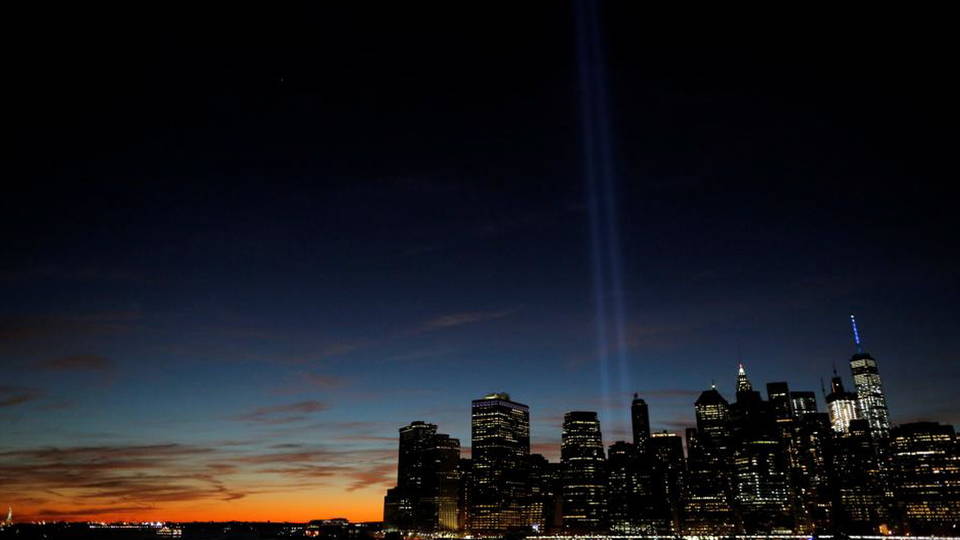 In New York City on Sunday, bells rang out at 8:46 a.m. to mark the moment 15 years ago that the first of two hijacked airplanes crashed into the World Trade Center. Thousands gathered in Lower Manhattan for a solemn ceremony marking the anniversary. Memorials were also held at the Pentagon and at the site in western Pennsylvania where a hijacked plane crashed on September 11, 2001.
In New York City on Sunday, bells rang out at 8:46 a.m. to mark the moment 15 years ago that the first of two hijacked airplanes crashed into the World Trade Center. Thousands gathered in Lower Manhattan for a solemn ceremony marking the anniversary. Memorials were also held at the Pentagon and at the site in western Pennsylvania where a hijacked plane crashed on September 11, 2001.TOPICS:
9/11
9/11 anniversary
Former EPA Chief Apologizes for Calling Post-9/11 Air Safe
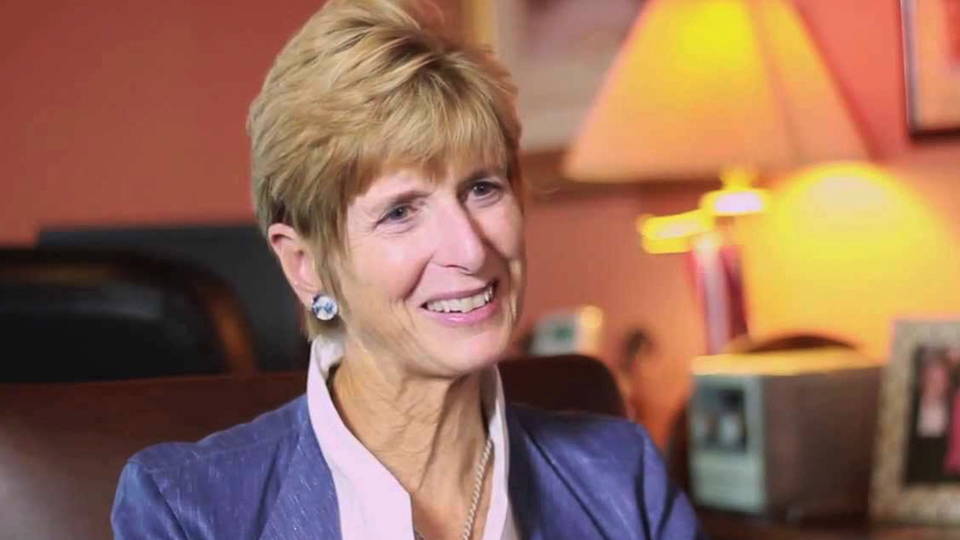 The Bush administration’s former top environmental official has apologized for telling the public the air in Lower Manhattan was safe to breathe after the 9/11 attacks. Christine Todd Whitman was head of the Environmental Protection Agency in 2001. In the days after the World Trade Center towers collapsed, Whitman repeatedly stated there was no threat of toxic air pollution.
The Bush administration’s former top environmental official has apologized for telling the public the air in Lower Manhattan was safe to breathe after the 9/11 attacks. Christine Todd Whitman was head of the Environmental Protection Agency in 2001. In the days after the World Trade Center towers collapsed, Whitman repeatedly stated there was no threat of toxic air pollution.Christine Todd Whitman: "Everything we’ve tested for, which includes asbestos, lead and VOCs, have been below any level of concern for the general public health."
Speaking to The Guardian, Whitman acknowledged for the first time that her statements put people’s lives in jeopardy. She said, "I’m very sorry that people are sick. I’m very sorry that people are dying, and if the EPA and I in any way contributed to that, I’m sorry." Whitman’s apology came as The Guardian reported the death toll among those sickened by the toxic fallout of ground zero will soon exceed the number of people killed on the day of the 9/11 attacks.
TOPICS:
9/11
Chile Marks 43rd Anniversary of September 11 Coup d'État
 In Chile’s capital Santiago, thousands marched to the city’s main cemetery on Sunday to mourn victims of the former dictatorship. On September 11, 1973, democratically elected President Salvador Allende died in the palace in a U.S.-backed coup, ushering in 17 years of brutal dictatorship under Augusto Pinochet.
In Chile’s capital Santiago, thousands marched to the city’s main cemetery on Sunday to mourn victims of the former dictatorship. On September 11, 1973, democratically elected President Salvador Allende died in the palace in a U.S.-backed coup, ushering in 17 years of brutal dictatorship under Augusto Pinochet.TOPICS:
1973 Chilean Coup
Imprisoned Army Whistleblower Chelsea Manning Begins Hunger Strike
 Imprisoned Army whistleblower Chelsea Manning has begun a hunger strike to protest her prison conditions. In a statement, Manning said she would only consume water and medication until she’s provided "minimum standards of dignity, respect, and humanity." She’s demanding a written promise from the Army that she will receive medically prescribed recommendations for her gender dysphoria. Manning is serving a 35-year sentence at Fort Leavenworth, Kansas.
Imprisoned Army whistleblower Chelsea Manning has begun a hunger strike to protest her prison conditions. In a statement, Manning said she would only consume water and medication until she’s provided "minimum standards of dignity, respect, and humanity." She’s demanding a written promise from the Army that she will receive medically prescribed recommendations for her gender dysphoria. Manning is serving a 35-year sentence at Fort Leavenworth, Kansas.TOPICS:
Chelsea Manning
Long Island University Students to Protest Lockout of Entire Faculty
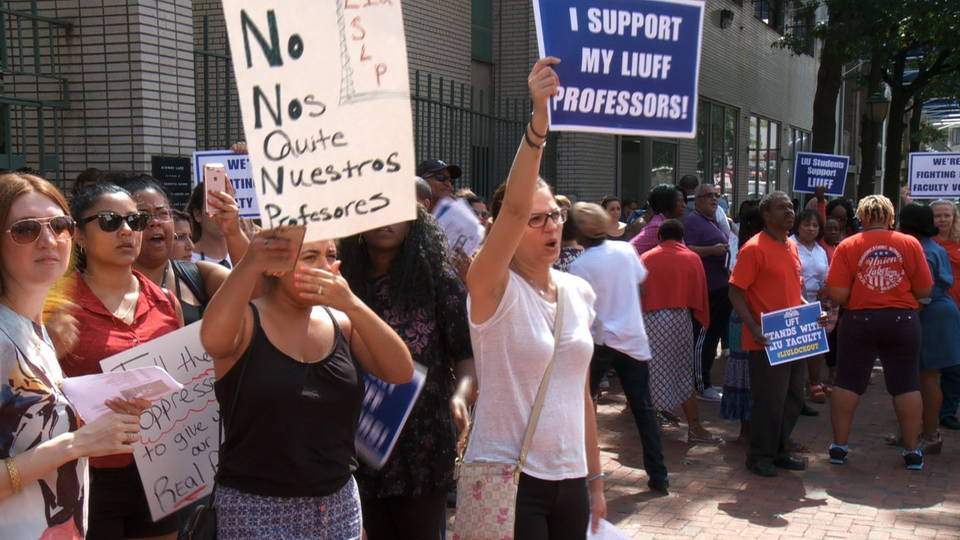 And in New York, students at the Brooklyn campus of Long Island University plan to walk out of classes at noon today to protest a lockout that’s seen every single member of its faculty union kicked off payroll and replaced. Over Labor Day weekend, just before the start of fall classes, all 400 faculty members at LIU’s Brooklyn campus saw their health insurance cut and their email accounts frozen. They’ve been warned they could be permanently replaced. This is LIU professor Larry Banks.
And in New York, students at the Brooklyn campus of Long Island University plan to walk out of classes at noon today to protest a lockout that’s seen every single member of its faculty union kicked off payroll and replaced. Over Labor Day weekend, just before the start of fall classes, all 400 faculty members at LIU’s Brooklyn campus saw their health insurance cut and their email accounts frozen. They’ve been warned they could be permanently replaced. This is LIU professor Larry Banks.Larry Banks: "I’ve been here at Long Island University for 15 years. And I’m outside the gate because the administration has locked us out. This is the first time this has happened in the country. And I feel horrible. There has never, ever been the administration saying, 'Teachers can't teach. We won’t allow it.’ That’s never happened. Never happened before in the history of education in this country."
Last week, LIU’s faculty union voted 226 to 10 against a labor contract that sought to slash pay for adjunct professors and failed to provide salaries comparable to those earned by colleagues at a satellite campus. The Faculty Senate overwhelmingly approved a no-confidence measure against LIU President Kimberly R. Cline.
TOPICS:
Education
-------
Donate today:
Follow:



WEB EXCLUSIVE
Follow:




WEB EXCLUSIVE
North Dakota v. Amy Goodman: Arrest Warrant Issued After Pipeline Coverage
Native American Activist Winona LaDuke at Standing Rock: It's Time to Move On from Fossil FuelsAs we reported on Monday, Sept. 12, 2016 – In other Dakota Access pipeline news, last Thursday, Morton County, North Dakota, issued an arrest warrant for Amy Goodman. The charge: criminal trespass, a misdemeanor offense. The case, State of North Dakota v. Amy Goodman, stems from Democracy Now!’s coverage in North Dakota over the Labor Day weekend of the Native American-led protests against the Dakota Access pipeline. On Saturday, September 3, Democracy Now! filmed security guards working for the Dakota Access pipeline company using dogs and pepper spray to attack protesters.
Protester: "These people are just threatening all of us with these dogs. And she, that woman over there, she was charging, and it bit somebody right in the face."
Amy Goodman: "The dog has blood in its nose and its mouth."
Protester: "And she’s still standing here threatening us."
Amy Goodman: "Why are you letting their—her dog go after the protesters? It’s covered in blood!"
Democracy Now!'s report went viral onlineand was viewed more than 13 million times on Facebook alone, and our footage was rebroadcast on many outlets, including CBS, NBC,NPR.org, CNN, MSNBC and Huffington Post. Also charged was Cody Hall for his alleged presence at the September 3 land defense action and for a subsequent protest on September 6. Hall is considered a lead organizer in the movement against the Dakota Access pipeline and was arrested at one of the checkpoints that have been erected by North Dakota authorities to restrict access to the Standing Rock Sioux Reservation and the growing pipeline opposition camps. Hall was denied bail and remained in jail throughout the weekend. Hall's attorneys and several others we spoke to confirmed that it is highly unusual for a defendant charged with misdemeanor trespass to be jailed and denied bail.
According to the criminal complaint against Goodman, the charges are based on a viewing of Democracy Now!'s video report of the incident, conducted by the North Dakota Bureau of Criminal Investigation. Special Agent Lindsey Wohl's sworn affidavit states that Goodman was there as a journalist. Wohl wrote, "Amy Goodman can be seen on the video identifying herself and interviewing protestors [sic] about their involvement in the protest." The criminal complaint was approved by Assistant State’s Attorney for Morton County Gabrielle J. Goter. To date, none of the private security personnel shown in the video both assaulting protesters and commanding their dogs to attack them have been charged or arrested. Democracy Now! is consulting with attorneys in North Dakota as well as at the Center for Constitutional Rights. CCR Legal Director Baher Azmy said, "This is clearly a violation of the First Amendment … an attempt to repress this important political movement by silencing media coverage."
Watch Amy Goodman’s Report from North Dakota
http://www.democracynow.org/2016/9/6/full_exclusive_report_dakota_access_pipeline
<iframe width="640" height="360" src="http://www.democracynow.org/embed/story/2016/9/6/full_exclusive_report_dakota_access_pipeline" frameborder="0" allowfullscreen="true"></iframe>
FULL Exclusive Report: Dakota Access Pipeline Co. Attacks Native Americans with Dogs & Pepper SpraySee Democracy Now’s full coverage of the Dakota Access pipeline
WEB EXCLUSIVE
Students Support LIU Professors in Contract Dispute: "End the Lockout, Negotiate & Let Us Learn"
NEW BOOK

Senior TV Producer
SPEAKING EVENTS

9/15 New York, NY
207 West 25th Street, 11th Floor
New York, New York 10001, United States
-------
-------




No comments:
Post a Comment